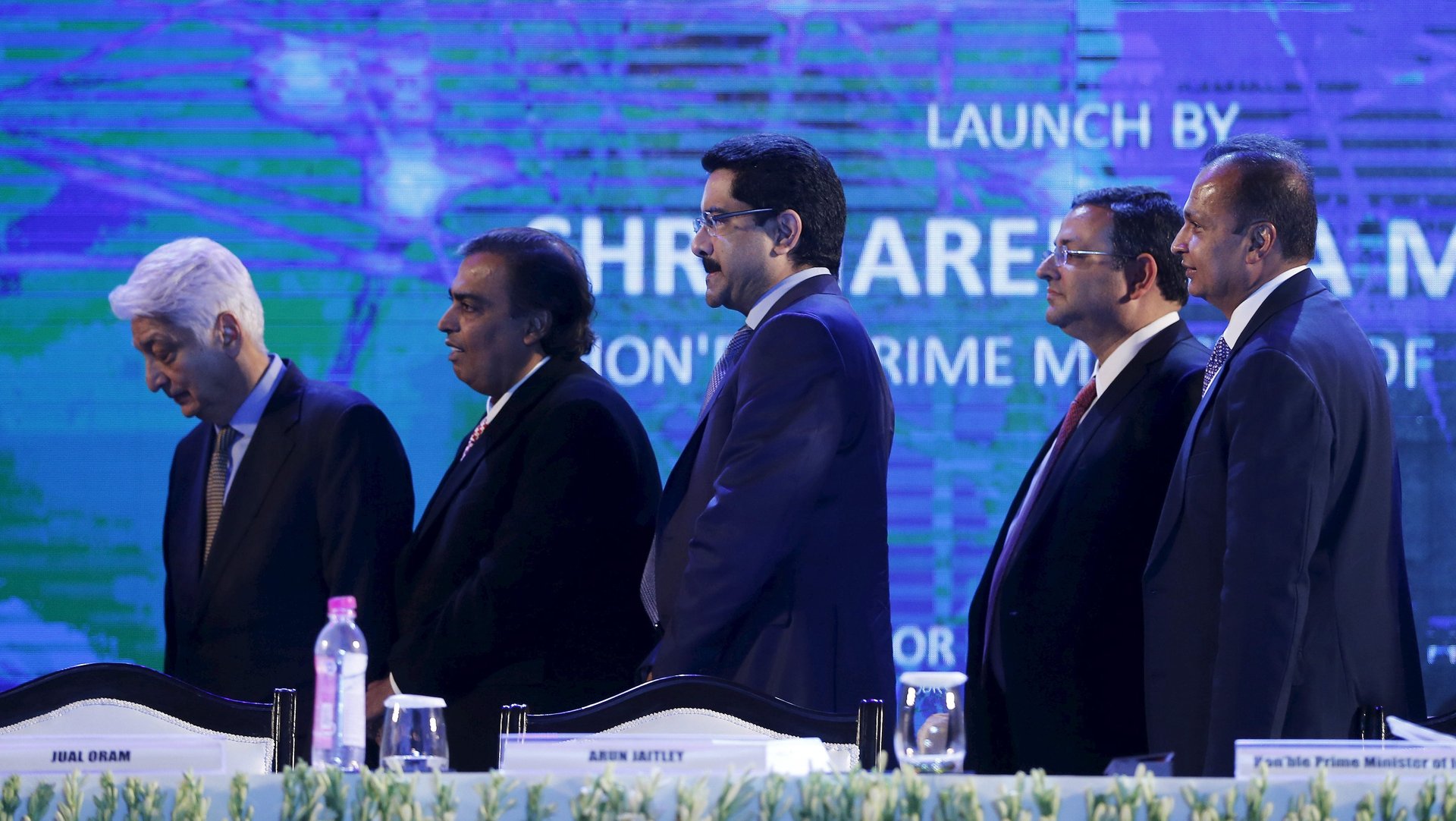Where are India’s celebrated billionaires in its hour of need?
This post has been corrected.


This post has been corrected.
At a time when thousands of Indians are struggling to pay hospital bills, buy medicines, and even afford cremations for their family members who have lost their lives to Covid-19, most of the country’s much-celebrated billionaires are either MIA or contributing in a way that can be called symbolic, at best.
On May 2, India registered over 392,488 new cases of Covid-19, a 29th consecutive day of more than 100,000 daily new cases. In April alone, the country has seen around 50,000 deaths due to the disease.
Yet, most of the ultrarich have so far not stepped up to help out the needy—not publicly, at least.
The few who have contributed to the cause have done so through the corporate social responsibility (CSR) pools of their companies, and not their own pockets. Indian laws mandate large companies to spend 2% of their average net profits for the preceding three years on CSR activities.
For context, with over 140 super-rich persons, India is home to the world’s third-highest number of billionaires.

It’s worth noting that the Covid-19 pandemic, which killed thousands of small businesses across India, has only made India’s rich even richer.
The country added 40 new billionaires in 2020. The country’s richest man, Mukesh Ambani, became 24% richer last year, while the net worth of the second-wealthiest man, Gautam Adani, went up by 174%.
It’s also worth noting that thousands of middle- and lower-middle-class Indians have spent the last several weeks trying to help family, friends, neighbours, and even strangers by contributing to charitable organisations or frantically mobilising resources for patients.
Meanwhile, an April 26 report in The Times of India newspaper stated that around eight private jets, costing around Rs72 lakh ($96,941) each, arrived from India to the London airport, 24 hours before the country announced the travel ban on India.
Here’s what we know about Covid-19 contributions from India’s billionaires so far:
Ambani and Reliance
On April 30, Ambani’s Reliance Industries said it had become India’s largest producer of medical-grade liquid oxygen from a single location. “Starting from nil” last year, the company now produces 11% of India’s total medical grade liquid oxygen at its refinery-cum-petrochemical facility in Jamnagar in the western state of Gujarat, it said. The company claims that its oxygen, which is being provided free of cost to many states, is meeting the needs of nearly every 1 in 10 patients in the country.
The same day, Reliance also airlifted 24 ISO containers that are used for transporting oxygen from Saudi Arabia, Germany, Belgium, Netherlands, and Thailand, creating an additional 500 tons of transportation capacity for India.
Earlier this month, Reliance had supplied over 15,000 mt tons of oxygen free of cost, helping nearly 1.5 million patients.
“For me and for all of us at Reliance, nothing is more important than saving every life as India battles against a new wave of the Covis-19 pandemic. There is an immediate need to maximise India’s production and transportation capacities for medical grade oxygen,” he said in a statement.
His efforts, however, are being criticised mainly because many feel they are too little compared to what he can afford.

One cause of this criticism is the fact that Ambani—who earned Rs90 crore an hour in 2020—was way behind fellow billionaire Azim Premji in his philanthropic contributions during 2020 when India was struggling with the first wave of Covid-19.
Premji, the founder chairman of Wipro and India’s 15th richest person, donated 10 times more than Ambani in 2020, according to the Hurun India and EdelGive India Philanthropy List 2020.
Adani and the Tatas
As India struggled to transport oxygen from factories to hospitals, the Adani Group arranged four ISO tanks with 80 tonnes of liquid oxygen from Saudi Arabia on April 26. Adani has also said that his companies are procuring 5,000 medical-grade oxygen cylinders from Linde Saudi Arabia, a provider of industrial and medical gases. Adani Group has also procured oxygen from Thailand and Dubai.
Similarly, India’s salt-to-software conglomerate Tata Group has been helping the country in its struggle with the oxygen shortage. The group’s subsidiary Tata Steel is supplying around 1,000 metric tons of oxygen on a daily basis to various states.
Some other legacy business groups have been donating at the local level. For example, Grasim Industries, a Madhya Pradesh-based unit of Aditya Birla Group, has donated 30 oxygen concentration machines to a city hospital in Ujjain.
Those who saved themselves
As per private jet providers, their services have been high in demand as many rich have been trying to leave the country, which has become a global epicentre of the pandemic. “It’s not only the ultra-rich. Whoever can afford to take a private jet are taking one,” Rajan Mehra, chief executive officer at New Delhi-based private jet firm Club One Air told Bloomberg.
Among those who have found safety for themselves and their families abroad is billionaire Adar Poonawalla, the CEO of Serum Institute of India (SII), which is responsible for supplying a majority of the doses for India’s vaccination programme. The “vaccine prince” has gone to London “for an extended period of time,” according to an interview in The Times (paywall) on May 1. However, he has said he would return to India in a “few days.”
Correction: An earlier version of this post said that Reliance had supplied over 15,000 million tons of oxygen free of cost.